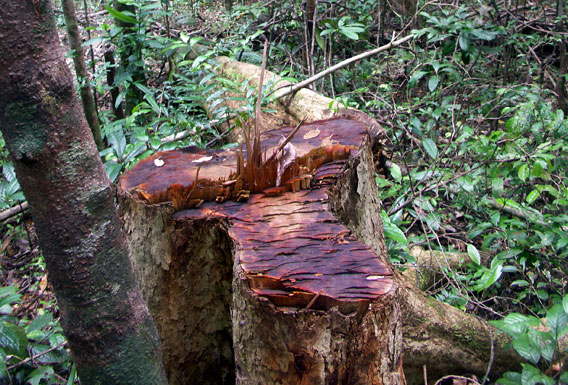
Rosewood logging in Masoala National Park, a UNESCO World Heritage Site. Photo by Rhett A. Butler
A motion filed last month by the U.S. Department of Justice alleges Gibson Guitar knew it was trafficking in endangered timber when it was busted by the U.S. Fish and Wildlife Service in November 2009, reports the Environmental Investigation Agency (EIA).
The filing — which argues Gibson lacks the right to claim ownership over the seized ebony because it is contraband — includes text from internal Gibson emails.
“[A] Gibson employee…wrote that ‘[t]he true Ebony species preferred by Gibson Musical Instruments is found only in Madagascar (Diospryos perrieri). This is a slow-growing tree species with very little conservation protection and supplies are considered to be highly threatened in its native environment due to over exploitation.’ In fact, [he] ‘spent two and a half weeks in Madagascar this June [2008],’ writing on his return, ‘I represented our company along with two other guitar manufacturers…. All legal timber and wood exports are prohibited because of wide spread corruption and theft of valuable woods like rosewood and ebony.’ (Emphasis added.)”
The federal prosecutors say that while Gibson knew of the questionable timber, and even acknowledged it as such, the guitar-maker went ahead with buying ebony from Nagel, a supplier in Germany.
“Gibson sourced its unfinished ebony wood in the form of blanks (for use in the manufacture of fingerboards for Gibson guitars) from Nagel (in Germany), which obtained it exclusively from Roger Thunam (a supplier in Madagascar). Madagascar prohibits the harvest of ebony wood as well as the exportation of unfinished ebony wood.”
“On February 25, 2009, in a reference to the potential long term solution, [he] wrote…that the company Maderas Barber ‘has been in the business a long time and may be able to help begin some legitimate harvests. Mr. [Roger] Thunam on the other hand should now be able to supply Nagel with all the rosewood and ebony for the grey market,'” stated the briefing.
Prosecutors are now asking the court to reject ownership claims of the ebony by Gibson and Nagel because it is inherently illegal to possess, “both because it was unfinished wood and because Claimants’ source for ebony in Madagascar was not authorized to sell it.” The government is expected to file criminal indictments.
The Gibson case was the first to be brought under the amended Lacey Act, which now puts the burden of securing legally harvested timber on importing companies, holding them to the environmental laws of producing countries, even when those countries are unwilling or unable to enforce their rules.
The case was an embarrassment for Gibson and the Rainforest Alliance, an NGO that certifies products for their environmental credentials. At the time of the bust, Gibson’s chairman and CEO, Henry Juszkiewicz, was on the board of the Rainforest Alliance, which certified the wood used in Gibson’s instruments.
Madagascar’s rainforests have been hard hit by demand for rosewood and ebony. In the aftermath of a March 2009 coup which disposed the island nation’s president, Madagascar’s rainforest parks were plundered by armed gangs funded by timber traffickers. Illegal logging was accompanied by the rise of a commercial bushmeat market for endangered lemurs and an increase in forest fires.
Logging slowed in recent months as the “transition authority” — run by parties that launched the 2009 coup — cracked down on illegal exports. The transition authority was under heavy pressure from the international community.
Related articles